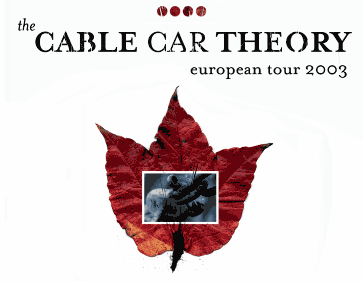

A couple of weeks ago I found the latest release of the Cable Car Theory in my mailbox, this being the "Fables and fiction of the human condition" EP. I actually had never heard anything from the New York based four piece before, so I was interested what to expect. I threw the CD in my player, listened to the EP and liked what I heard. In the next days I listened to it some more and the more I heard their music, the more I liked them. After a while I knew every word and every chord (guess from which band I stole this line) and I loved the record. When their European promoter asked me if I wanted to do an interview with them during their European tour I immediately said yes. On Sunday, 23rd of February, the Cable Car Theory played a German show in Karlsruhe, the city I live in. Before the show I did an interview with the entire band even though some of them very pretty sick. Thanks guys, it was a pleasure for me to talk to you.
If I am right your new EP is coming out tomorrow...
John: I don't know, I thought it was out already.
Well, on the promo sheet I got there's a release set for February 24th, so...
Brian: We saw it in record stores, Green Hell covers it, and I guess a friend of mine ordered it from Defiance already. I guess tomorrow's the official release date.
Is it in a way strange for you to tour before the record comes out officially?
Brian: Well, we had them for the first day of the tour, it has no effect whether we tour.
Nathan: It's great that we had them for the tour, that is really, really cool because we have the actual record to sell, but I mean we would have toured with or without the record.
But the fans didn't know the songs before they came to the shows.
Nick: That's actually not true, because last week I've seen a group of kids singing along. I was shocked, I don't know how they got the CD.
Maybe through the internet.
John: Yeah, Defiance had one or two songs on the website.
I have to admit that I didn't know the Cable Car Theory before this EP, so could you please give me a short history of the band?
John: We started in 1997. Brian and I were members of a collective. The original drummer was also a member of the collective. At one of our earlier shows we were looking for a second guitar player and that's why we got Richie. Sean, our original drummer, left the band two years after that. Derek joined the band after that, he was the drummer who played on "The deconstruction" and we toured over Europe for the first time. He left after "The deconstruction" and Joey who's currently the drummer and Richie weren't able to make it on this tour, so we got Bennie from the Low End Theory and Nick filled in.
Why couldn't the drummer and the guitarist couldn't make it over here?
John: Their jobs wouldn't allow them.
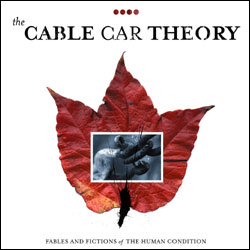 Why didn't you put out an EP
and not a full length, was it because "The deconstruction" was
released last year and you thought it would be too early for another full
length?
Why didn't you put out an EP
and not a full length, was it because "The deconstruction" was
released last year and you thought it would be too early for another full
length?
John: No, the music is in a totally different direction, one that we hope to keep heading forwards. It just made a lot more sense to do a short record because it's very, very different from what we were doing. The old songs were a lot more noisy, a lot more chaotic, the lyrics were a lot more straightforward. Now I use a lot of literary devices in the lyrics, the music's a lot more groove oriented, things like that. For a band that came out with an album like "The deconstruction" and the next one sounding even more different than the EP, I think we would do ourselves a lot of harm in terms of people who really like the band not to give them a middle of the road record so they can see how we changed and progressed. To give the people the direction we're heading for. The music for the next full length is gonna be a lot smarter than what we were playing two or three years ago. It's a lot harder to write this way, because in the past we had just a bunch of parts that when we played them there was a lot of energy behind them. No we try to write music that's a lot more interesting to listen to than just energy coming straight across. We still wanna have that energy and the intensity we always had.
I often have the impression that many bands are really good musicians, but the music they play is way too complex. Because at a show people are just standing there not knowing what to make of it...
John: We're actually playing more complex, but it's not mathy. It's just smarter, and I think the parts that we're playing now the wouldn't have been able to handle four years ago.
Bennie: I think when a band takes their tempo down and plays not so hectic there's a new set of challenges that comes along with that. You really have to understand the concept of the time changes, the timings altogether, melody and rhythm are on a higher level. I guess a whole new set of challenges comes along when you don't play so fast and aggressive.
Do you think your old fans will follow this development you made?
John: We are not that big of a band that we have like a huge fan base, ha ha.
Brian: I've been hit with both sides of it, Kids have come upŘ to me and said "I like the new record a lot more than the older stuff", and I've gotten "I like the older stuff better because it's more chaos, more chaotic and aggressive".
Nick: When I first started playing the songs with them, there was a lot more tone down, but still difficult to play. But I liked the songs immediately, the lyrics really affected me in a way. So I think when you're open minded and listen to it, you'll definitely like it. I like the chaotic stuff, but I'm not the kind of guy who's like "I don't like them anymore if they change their style." I mean I'm coming from outside the band, I think it's likeable already.
Bennie: I think they suck, I'm here for the money! (Everyone's laughing)
Brian: The money and the women!
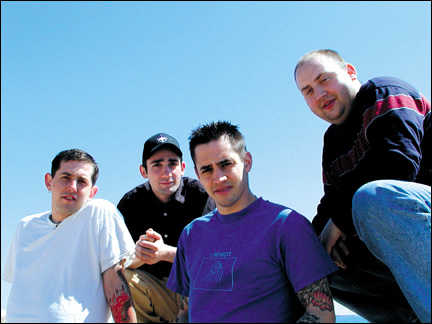 Talking about the lyrics, I
heard that you John are studying philosophy.
Talking about the lyrics, I
heard that you John are studying philosophy.
John: Yeah.
Would you say that your studies have an influence on your lyrics or the way you write them?
John: Yeah, absolutely. Like I said, the new stuff is a lot more crowded with literary devices. Actually I sit down and think through the process from beginning to end, trying to question cause and effect, relationships and the issue I'm trying to talk about whether it's personal, political or whatever, if we wanna make a political statement in a song, it's got to be from a perspective that's not absent. On every tour we encourage people to come and talk to us because if you actually care about making a difference in terms of an issue or in terms of society or whatever, you have to be a flexible person, and if you're not or if you're secretly an aristocrat you wouldn't want to change anything in the first place. Overall I think that's the biggest thing that I've got from philosophy. I train myself to think about HOW I think about things.
Did you ever think about expressing yourself not only through the lyrics but also by releasing a book or an article etc.?
John: I already have a few papers out. When I go back, you know, I haven't been in school for a while, I actually attended an audio-engineering school after the last tour. When I go back to get a masters or a doctor I want to teach as well.
So do you see your future as a teacher or as a musician?
John: If I could, I would play music until the day I die. Practically I'm finishing an apprenticeship as a tattoo artist as well. So is Brian, we've worked for some of our best friends. The job affords us the free time to do things; I pursue finishing an education and going on tour. If I could teach, tour and tattoo I would be the happiest man on the face of the earth. But even if I'd went after one out of the three as a full time thing for the rest of my life, I'd still be happy.
I could imagine that you are confronted with a lot of questions about your attitude towards the US American politics concerning Iraq, do you like to talk about such issues or do you handle it the way like Bill Stevenson from the Descendents / ALL said it in the ALL song "Politics": "Keep your politics out of my music"?
John: Haha, I really love ALL, but sometimes I don't agree with what they say. Of course we like to talk about political issues.
Bennie: The one thing I'm trying to point out is that the opinions of the American people are generally completely different to the actions and opinions of the American government. And that's something I'd like to make clear to people. What's going on in the things our government are doing right now aren't supported by the American people.
John: There were two protests on the East Coast alone in the last three weeks, 500.000+ in New York City, 500.000+ in Washington D.C. If the American people were really represented by the Government you wouldn't see such large numbers turning out to these protests. The first thing about our current executive officer is that he came into power through criminal activity, so anything he does is a criminal act, and that's actually the way the majority of the country feels.
Do you think these protests affect the American government?
Bennie: Not necessarily.
John: The way that the American political system is set up, the executive branch has basically no co-relation to the majority of the populus. The actual way that it's set up is that when the American people vote for the President, they don't actually vote for the President. Where we do have in America a direct influence on what happens is things like the Senate or the House of Representatives, local judges, things like that. We talked about this amongst ourselves, I'm getting really mad at my friends. They don't vote. If a lot more people involved in this kind of community or this kind of music scene or generally a lot more people in our age group voted, things could get better. You'd see hundreds and hundreds of State Senators who were a lot more shifting towards progression.
Within this music scene one normally should expect that people are interested in such issues...
Bennie: Just because people are involved in this scene doesn't necessarily mean that they're eventually care.
John: That's true.
Bennie: If you actually have a feeling about what punk rock is like... I mean punk rock was in its prime and is still designed for change, a movement for people who don't have a voice who wanna use it for that. You should vote, you should be active.
John: You don't necessarily have to agree with voting for the guy I would vote for, I just get mad when I talk to a friend who doesn't vote at all.
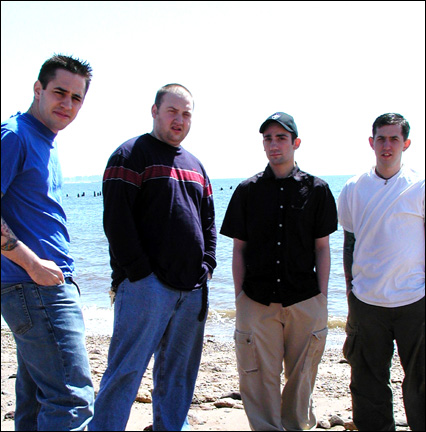 Bennie:
The you don't have a right to complain.
Bennie:
The you don't have a right to complain.
John: I think that Hardcore especially was out of all the different forms of punk rock music the one that was supposed to be the most open to dialogue. That doesn't really exist anymore. On the East Coast we have now Straight Edge Gangs and Street Thug Gangs, that's Hardcore nowadays on the East Coast. That's NOT what it was supposed to be, you know. It's totally lost a lot of its vision.
I think that's very sad, because I'm straight edge and I think this destroys the whole positive meaning that's behind it.
Bennie: We shouldn't typecast the whole American straight edge kids...
John: Oh no.
Bennie: ...but there are certain sects in certain areas, like in Syracuse, Utah. The straight edge people in Utah... two of them are arrested because of beating a kid down and carving an X in his back with a knife. It happens, but again I mean kids like them are hardline, totally different from the normal straight edge people.
John: I was actually just rapping on the counting growth of gangs in Hardcore, like the Street Thug Gangs.
Bennie: I still haven't seen a gang member. I always thought about the punk rock and Hardcore culture as the new generation hippie, but not in a sense of "Peace" and "smoking dope", you know. But to go as far as forming gangs and thinking because you're straight edge "If you're not straight edge we're gonna beat the shit out of you" that's really bad. It takes the validity of the idea. I think when you're dealing with any counterculture including hippies, punks, whatever they were, you're going to have a certain group who are about active action and a certain group who are about passive action. The hippies had it, punk rock kids have it, it's the same thing. Some people just choose a different message to get the message across.
Nick: The whole idea about it for me was feeling to belong to something. If you're going to these Hardcore shows where bands speak their minds and you almost agree with them all the time, you get into activism and things like that, that's really what I think it was all about. I totally have no respect for tough guys.
Did you also experience violence at your shows?
John: Well, if you're going to New York City Hardcore shows, you made your experiences with violence, ha ha. When I was 15 I got hit in the back of my head with a bottle.
Brian: I got one side of my face smashed. I have a plastic cheekbone due to it. It was probably my own stupidity. I was at a show and I was on the outskirts of the mosh pit and I got hit, I don't know if it was deliberately.
Bennie: What band was it?
Brian: Breakdown. (Everyone laughs)
Bennie: I got beat up by three skinheads at a Snapcase / Turmoil show. That's one thing I noticed in Europe, maybe it's just our shows, but even at real hard show kids seem to enjoy the music. It's totally different. You got certain shows in America where it looks like a warzone. If you're going to a Hatebreed show it looks like Kung Fu. The singer of Brother's Keeper (don't mix this American Hardcore outfit with the crappy and annoying hip hop act from Germany - Stefan) got stabbed in the leg less than a year ago at a show. One guy of 18 Visions got a bottle of whiskey broken over his face, kids from Earth Crisis started a fight at a show in New Jersey. I've definitely seen it.
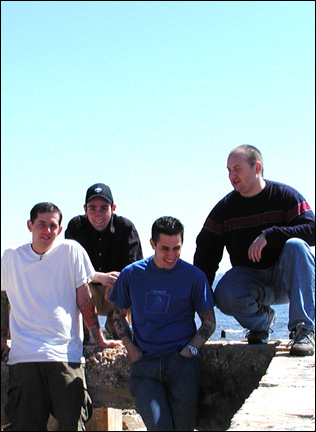 But
these are bands that play some violent kind of Hardcore.
But
these are bands that play some violent kind of Hardcore.
Bennie: Yeah, you see it more at these kind of shows. The more aggressive the music is, the more dancing the people do...
John: Unfortunately the trickle down effect of alternative music in general becoming popular years ago was that a lot of meatheads were coming to shows, playing football at a Hardcore show. (Laughter)
We then had a really long conversation about all kinds of stuff, like the favourite show we saw, our favourite movies etc. Brian got so excited about his faourite movie "The big Lebowski" that he wanted to go bowling after the show. So during their set John invited the kids to go bowling with the band afterwards. The show itself was amazing. Very powerful, very tight, even though Nick couldn't handle the second guitar because he felt sick. But the rest of the guys definitely rocked and the audience (about 100 people in a really packed club) loved them. They did a lot of the songs from the new EP, some old ones and a great cover by an old Unbroken song. I can definitely say that this was one of the most pleasant interviews I ever did and that the guys in the cable Car Theory are some of the nicest people around. Oh, Brian, I will remind you of your promise when I'll ever be in the US again in the future: At the end of their set when we were wishing farewell t he told me: "If you're in the US, come visit us. We'll tattoo you for free."